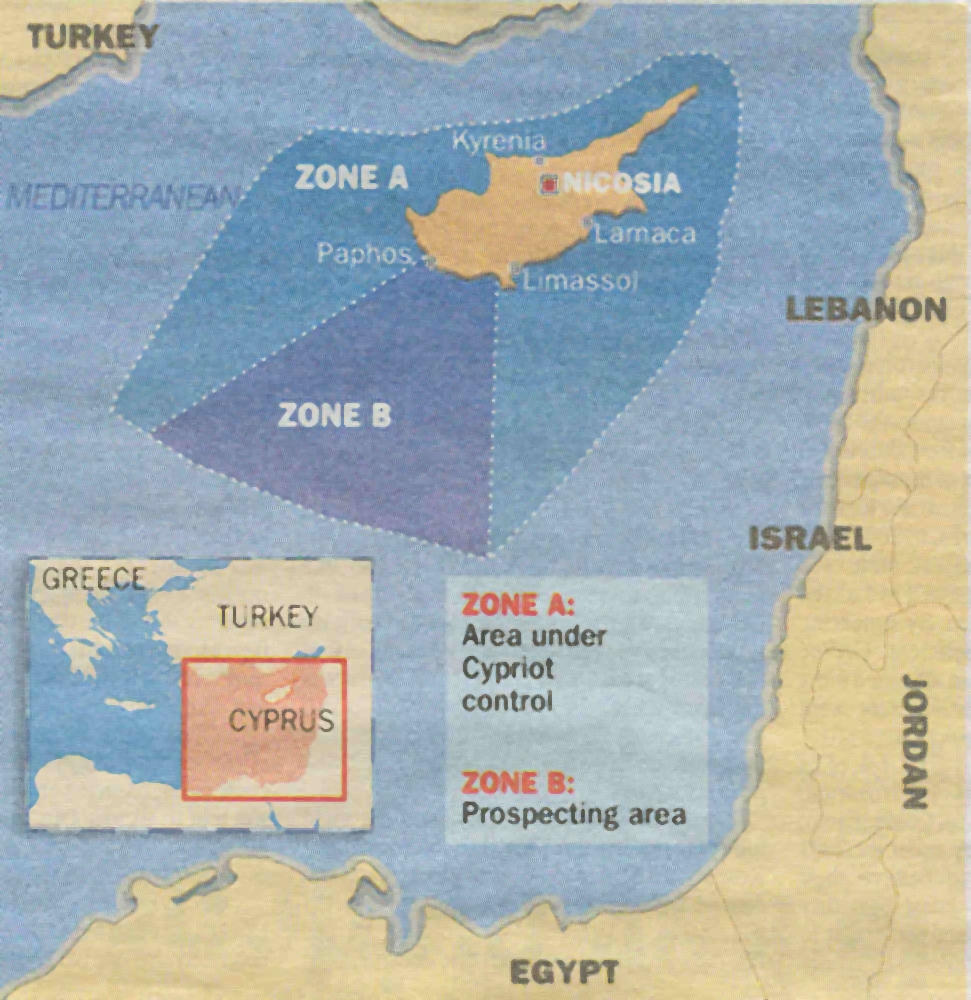 |
||
|
The New Cyprus Controversy: Oil Cyprus is inviting offers to exploit billions of barrels of offshore oil,heating up the controversy over the economic isolation of Turkish-Cypriots |
||
|
The Cypriot government has raised Turkish ire by issuing an international tender for oil and gas exploration off its southern coast.
The offshore-licensing tender begins on February 15 and industry giants such as BP, Exxon and Mobil have shown an interest, requesting seismological data prepared by Oslo-based Petroleum Geo-Services (PGS), an oil-prospecting company. Offshore oil and gas resources surrounding Cyprus in the past have been reportedly estimated at six billion to eight billion barrels, worth about $400 billion at current market rates. But there are no reliable figures. |
 |
|
| Turkey has filed a demarche with the Lebanese government over an agreement signed by Cyprusand Lebanon on January 19 to divide the sea area between the two countries into exclusive economic zones. Egypt was also warned not to pursue a similar deal it had signed with Cyprus previously. "Turkey is determined to protect its rights and interests in the Eastern Mediterranean and will not allow attempts that would erode them," the Turkish foreign ministry said in a statement The Turkish military denied a report by Agence France Press on February 1 that it had sent warships towards Cyprus in response to the deal. The Greek government weighed in to accuse Ankara of violating international law by attempting to interfere with Cypriot exploration plans. "(It) is in total contradiction with international law and the right of sovereign government to negotiate international agreements," foreign ministry spokesman George Koumoutsakos said. The accord was signed after secret yearlong negotiations by Cypriot Foreign Minister George Lillikas and Lebanese Public Works Minister Mohammed Al-Safadi (Nicosia agreement with Egypt was signed in 2005, and Egypt has just conducted a drilling in its economic exploitation zone). Cypriot President Tassos Papadopoulos pointed out that the sea area in question is to the southeast of the island republic, which lies at the underbelly of Turkey, and not between Cyprus and Turkey. "In all cases when we start negotiations, Turkey's presence is strong, and this is why it is best that something goes forward before it is made public," Papadopoulos said, explaining the confidentiality of Lebanon-Cyprus negotiations. Turkey argued that it should have been consulted before any agreement because Cyprus also has "a Turkish area". A 1974 invasion by Turkey carved a Turkish-Cypriot self-styled state in the northern third of the island, which remains internationally unrecognised. Publicly, it was Turkish-Cypriot leader Mehmet Ali Talat who initially questioned the legitimacy of Cyprus' right to exploit exclusively the island's offshore oil resources. In a statement issued on January 29, spokesman Hasan Ercakica declared that "the attempt of the Greek-Cypriot side to sign agreements with neighbouring countries is unacceptable". The statement echoed Talat's earlier thinly veiled threats that Cyprus' oil exploitation deals would cause "tensions" on the island. Cypriot government spokesman Christodoulos Passiardis replied that the government merely exercised its inalienable sovereign rights. He called Talat's warning a "ridiculous, knee-jerk reaction unworthy of comment". The Cypriot government says any inter-communal sharing of natural resources is contingent on a political settlement between the two sides. A United Nations reunification plan was overwhelmingly rejected by Greek-Cypriots in April 2004. Turkish-Cypriots accepted it. Since then the European Union, which admitted Cyprus divided a month later, has tried to forge a relationship with the unrecognised government in the north. In the latest twist, Nicosia has reacted sharply to a draft European Parliament report that recommends giving elected officials of the occupied northern Cyprus regime observer status in the European Parliament. It calls for directs talks with Talat and calls for direct trade with the occupied north as a means to end Turkish-Cypriot "isolation". Cypriot Europarliament members are stirring up opposition to the report. Conservative MEP and former Cypriot foreign minister Yannakis Cassoulides said he intends to lobby the European Popular Party. Cypriot MEPs see this, like a similar effort they thwarted about two years ago, as an effort to upgrade the status of the occupation regime. The Cypriot government maintains that all Turkish-Cypriots are entitled to Republic of Cyprus passports, granting them the benefits of EU membership. The Republic of Cyprus has also extended free healthcare to Turkish-Cypriots regardless of means, a measure that has led to charges of discrimination by wealthier Greek-Cypriots who do not enjoy such benefits. |
||
|
(Posting Date 19 February 2007) HCS readers can view other excellent articles by this writer in the News & Issues and other sections of our extensive, permanent archives at the URL http://www.helleniccomserve.com./contents.html
All articles of Athens News appearing on HCS have been reprinted with permission. |
||
|
||
|
2000 © Hellenic Communication Service, L.L.C. All Rights Reserved.
http://www.HellenicComServe.com |
||

